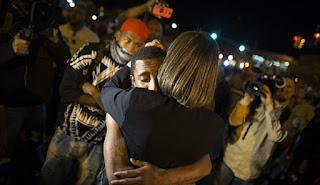To Kill a Mockingbird, Harper Lee
Are you shocked? Floored? Flummoxed? Bamboozled? I didn't think so. There's no way I could read Watchman and not re-re-re-re-read Mockingbird. And, as I also re-watch Pretty Little Liars now that the show has revealed who A is, I realize the Liars are reading Mockingbird for English class. So Liars gets a little more credit from me (the mental hospital is named Radley, too, but I had not forgotten that fact).
So, Mockingbird is required reading in high schools across the country, with good reason. It opens the door for Humanities teachers to discuss racial history in the U.S., introduces students to an influential female writer, and gives an accessible account of southern life during the Depression. All of that is great, but it's not why I love this story. When it comes down to it, I love Scout. She's precocious, obnoxious, naive, and wise. She's brash, unruly, unladylike, and charming. She is, in short, a little girl.
Now that Mockingbird is fresh in my memory, the conflict of Watchman is actually pretty predictable and is totally fitting with the characters. We love the Atticus of Mockingbird for many of the same reasons we (the readers and Jean Louise) feel betrayed by him three decades later. It's funny how much the era of the story affects how we feel about the exact same behaviors. In the 30's, he was a leader, a champion, worthy of our adoration. In the 60's the same kind of ideas land him firmly in inexcusable territory. This, of course, is indicative of how fast things changed in this country during those decades, but also how we are willing to overlook things we don't like (paternalism, pity) if our hero does something great (defending a black man against accusations made by whites). This idea still holds true today. How much bad are we willing to ignore if the overall result is good? What is the tipping point at which we change our opinion of a person or organization?
While I think this is all important stuff to think about and discuss and question, it's not the root of why I love this book so much. In fact, it's peripheral to the heart of the novel, in part because a nine-year-old doesn't really grasp the implications of the case her father is working. Scout just takes the world at face value. She believes what her important adults (Atticus, Calpurnia, and Miss Maudie) tell her and suspects everyone else of falsehood. She is quick to defend those whom she loves and has a strong sense of fair, even if it is flawed. Her father has taught her important truths she won't learn anywhere else, namely that all people, even those we deem beneath us, have dignity and deserve if not our respect, then their privacy. It seems to me that this is a dangerous lesson, minding your own business to the detriment of your fellow humans. He starts out with a grand idea but let's it fizzle out in the details.
Scout, however, just applies her lessons to everything. She doesn't see the subtleties of the class divisions in her community because she believes that people are people. She knows they exist, that certain families just have their ways, but she is pragmatic and doesn't judge those other ways. This lovable little tomboy teaches (and learns) more about community than many give her credit for. Often readers feel like they are with her in Atticus' lap, that they learn alongside her. But in my estimation, Scout Finch is the true hero of the tale.
Even though it is set in the 1930's, Mockingbird still is relevant today. One paragraph stood out to me, speaking volumes about how quickly and easily we dehumanize each other. After confronting a group of men who set out to harm the black man accused of raping a white woman, Atticus tells his son, "A mob's always made up of people, no matter what ... a gang of wild animals can be stopped, simply because they're still human. Hmp, maybe we need a police force of children ..." Our failure to see others as humans is easy and enormous. Instead of images of five Marias, I'll leave you with these three images of humanity during conflict. (And, I'd like to just say that it is crazy to me that Sen. Pugh was criticized for hugging a rioter. What she did was not condoning actions but saying, "I see you, I hear you, I acknowledge that you are a person.")




